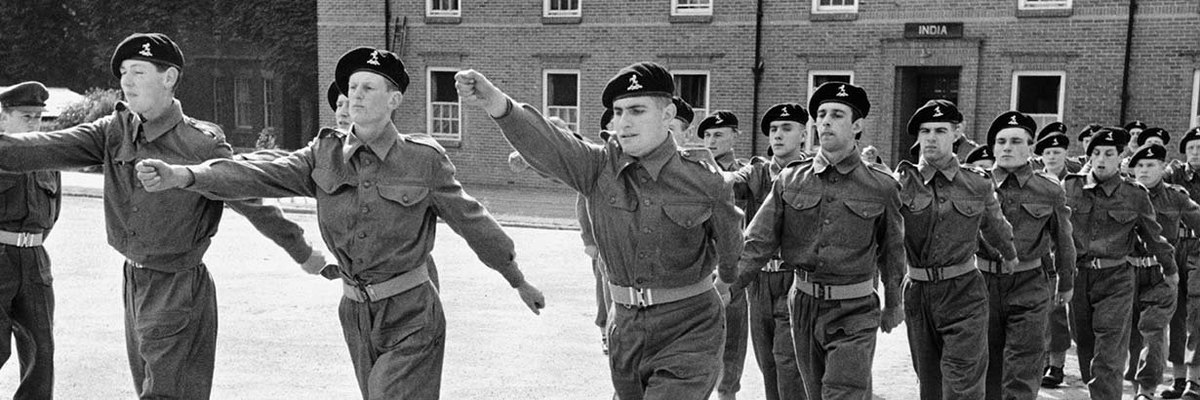For our most recent data on conscription, see our article More than a third of under-40s would refuse conscription in the event of a world war
One of my grandsons is in his final year at university. He doesn’t have a job lined up after he graduates because he knows what he’ll be doing for the first year. He will be serving in the Greek armed forces. That’s because he was born in Athens and all Greek males between the ages of 19 and 45 are required by law to serve in the military for twelve months. It used to be possible to get away with nine months but the government has just tightened up the rules without notice.
You might expect the young men to raise the roof at being forced to join up. A whole year of their precious youth snatched away … forced to take orders from a bunch of NCOs without a fraction of their hard-earned education. And it’s true that only a small minority positively want to do it. But it’s generally accepted without too much fuss because that’s how it has been for generations. It's just part of life and some say that if you have the right contacts it can be quite a cushy job. Nor is it conscription politically divisive. The Communist party of Greece doesn’t approve but that’s based on wanting Greece to leave Nato.
And what has any of this to do with your life or mine? It’s because some form of conscription in this country, which ended in 1960, is back on the political agenda. In Greece it has never gone away, largely because of the ever-present threat from Turkey, but the threat to all of us is, we are told, some sort of direct confrontation with Russia.
No less a figure than General Sir Patrick Sanders, the UK’s most senior soldier and head of the army, has declared that Britain must recruit a ‘citizen army’ ahead of any conflict with Vladimir Putin. He said preparing for war against Russia should be a ‘whole-of-the-nation’ undertaking, including ‘national mobilisation’. He noted that countries such as Sweden are taking measures to prepare for war and the UK needed to broadly follow Stockholm’s example. We should take ‘preparatory steps to enable placing our societies on a war footing’. Such action was ‘not merely desirable, but essential’.
The British army is at its smallest since Napoleonic times 300 years ago. It has shrunk by 28 per cent in the past 12 years alone to around 103,000 soldiers. Only 76,000 of them are regulars and the rest are reservists. Sir Patrick said this trend must be reversed: ‘We need an Army designed to expand rapidly to enable the first echelon, resource the second echelon and train and equip the citizen army that must follow…Within the next three years it must be credible to talk of a British Army of 120,000.’
But even that, he said, would not be enough: ‘Our friends in eastern and northern Europe, who feel the proximity of the Russian threat more acutely, are already laying foundations for national mobilisation. Taking preparatory steps to enable placing our societies on a war footing when needed are now not merely desirable but essential.’ The foundations for ‘national mobilisation’, he said, could not be confined to countries neighbouring or close to Russia, and ordinary people in the UK would be forced to join the UK’s regular army to see off an active threat to mainland Europe. He believes that we need a combined force of half a million full-time troop and reservists.
Within days of the British general sounding the alarm an even more senior figure on the world stage was doing the same: Carlos Del Toro, the American secretary of the navy and one of the top defence officials in Washington. He told journalists at the Royal United Services Institute in London that the world is changing ‘at a lightning pace’ and Britain needs to ‘reassess’ the size of its armed forces in light of the rising threats.
Those words will not have been welcomed in Number Ten. It’s not only extremely rare for such a senior Washington figure to deliver such a warning in public on such a sensitive issue but it comes at a time when the government is coming under growing pressure even from within its own ministerial ranks. The defence secretary himself (Grant Shapps) has warned that we are moving from a ‘post-war to a pre-war world’.
The message from Nato echoes those warnings. Britain’s former top Nato commander, General Sir Richard Shirreff, wrote to The Times: ‘It is pure smoke and mirrors for the MoD to claim that Britain is anywhere near being ready for a war of the scale and ferocity that would engulf this country if Nato had to go to war with Russia to defend an ally. As for the army, the assumption must be that to generate a single warfighting division (the unit of currency that matters in war), two peacetime divisions are needed. Hence, General Sir Patrick Sanders is right to call for urgent expansion of the army from its derisory size of 74,000 to 120,000.’
So there seems to be pretty broad agreement amongst military chiefs and many politicians that Britain needs a bigger fighting force. But the question, as Shirreff himself says, is where those fighting forces are going to come from. The obvious answer is to recruit more, but that has been tried over the past several years and it has failed. The number of fighting personnel is in freefall. And anyway, it’s enormously expensive to recruit the huge numbers needed: ‘The cost of expansion by volunteers is likely to be out of the question, even if the numbers of young men and women needed were prepared to come forward (which is unlikely).’
And here we get to the nub of it. If there is general agreement that we need a bigger military – and there is – where are the new recruits going to come from? In the words of General Shirreff, ‘Now is the time to think the unthinkable.’
And what does he mean by ‘unthinkable’? In a word: conscription.
Here’s how he puts it: ‘To most professional soldiers (myself included), conscription is anathema. However, if deterrence is to be effective, Russia deterred and catastrophe averted, it might be necessary.’
Shirreff is hardly alone in seeing conscription as anathema. The Ministry of Defence has been insisting that ‘there is absolutely no suggestion’ of a return to national service. It would be a brave and possibly foolish politician who told half a million 18 year-olds that they would suffer the same fate as my Greek grandson when they reached the age of eighteen. Or would it?
It’s eighteen months since Sweden – long regarded as one of Europe’s more pacifist nations - applied to join Nato and, as Miranda Bryant reported from Stockholm for The Guardian, there has been a sharp change in the country’s approach to defence and international relations. But in recent weeks, she writes, a ‘looming sense of potential conflict has swept the country as citizens were warned to prepare themselves for the possibility of war.’ Not everybody will be required to do military service but the government has restarted ‘compulsory civic duty’, a form of national service which was dismantled after the cold war.
About 100,000 young people will be called up for military duty next year and, says Bryant, ‘about 10% of them will be doing so unwillingly. In the past, only those who expressed interest in serving were required to do so, but insufficient numbers last year led to a change of policy. The new mandatory civic duty will at first only apply to those who are trained in emergency services and electricity provision, but it is the first step in what is expected to be a much broader national service programme. Carl-Oskar Bohlin, Sweden’s minister for civil defence has said there ‘could be war in Sweden. A full return to civic duty is being considered further down the line.’
And the prime minister, Ulf Kristersson, had this warning for his people: ‘Step by step, we are now building up the new total defence. It is up to citizens to ensure Sweden’s security. Citizenship is not a travel document’.
So where do you stand in this debate? Do you accept what so many leading figures are telling us: our armed forces are no longer capable of doing what would be required of them if the world continues on this dangerous path? If you do, should we consider a return to some form of national service? Obviously it would be good to hear from those of you who might be affected directly. Does the prospect of a year (or more) in the armed forces fill you with horror or might it hold some appeal – particularly if (like Sweden) it gives you the chance to study in your chosen field such as electronics and even get paid for it? Or do you recoil at the merest hint of it happening? And if you are a parent of a teenager do you share that horror or even welcome the notion that a year of military discipline might even be good for them?
Let us know.







